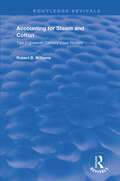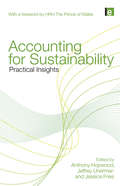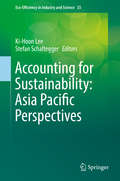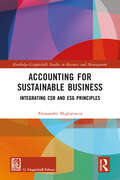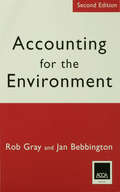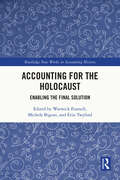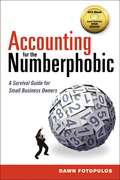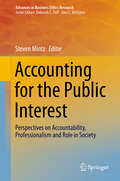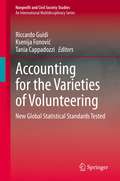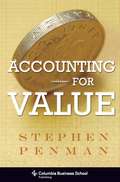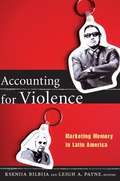- Table View
- List View
Accounting for Steam and Cotton: Two Eighteenth Century Case Studies
by Robert B. WilliamsFirst published in 1988, this book arose from the author’s fascination with the period of the late eighteenth century and the two industries of cotton and steam that seem to characterise the period, the provision of power through the manufacture of steam engines and the rise to prominence of the cotton industry. Includes photographs and an exploration of people in these industries during the Industrial Revolution.
Accounting for Sustainability: Practical Insights
by Anthony Hopwood Jeffrey Unerman Jessica FriesIf businesses and other organizations are to meet the many and complex challenges of sustainable development, then they all, both public and private, need to embed sustainability considerations into their decision-making and reporting. However, the translation of this aspiration into effective action is often inhibited by the lack of systems and procedures that take sustainability into account. Accounting for Sustainability: Practical Insights will help organizations to address these issues. The book sets out a number of tools and approaches that have been developed and applied by leading organizations to: - embed sustainability into decision-making, extending beyond an organization's boundaries to take into account suppliers, customers and other stakeholders; - measure and link sustainability and financial performance; - integrate sustainability into 'mainstream' reporting, both to management and external stakeholders. In-depth cases studies from Aviva, BT, the Environment Agency, EDF Energy, HSBC, Novo Nordisk, Sainsbury's and West Sussex County Council show in detail how accounting for sustainability works in practice in a wide range of organizational contexts. Published with The Prince's Charities: Accounting for Sustainability
Accounting for Sustainability: Asia Pacific Perspectives (Eco-Efficiency in Industry and Science #33)
by Ki-Hoon Lee Stefan SchalteggerThis book advances the understanding of corporate sustainability and challenges and roles of sustainability accounting in the Asia-Pacific region. The Asia-Pacific region has shown fast economic growth for several decades which is expected to continue. In this context, Asia has become the "production engine" of the global economy. At the same time scientific reports reveal that some planetary boundaries are crossed, for example relating to biodiversity and climate change. Companies in the Asia-Pacific region are therefore increasingly challenged to reduce their environmental impacts, to document their social contribution and to contribute to sustainable development. Key approaches to identify sustainability problems and challenges, to support improvement processes and to back up sustainability contributions include accounting and reporting. In contrast to the high relevance of accounting and reporting for corporate sustainability for the Asia-Pacific region, academic research has so far been dominated by Western researchers and pre-dominantly dealt with Western and Japanese cases and approaches. It is thus time to take account of Asian perspectives on accounting and reporting for sustainability in the Asia-Pacific region.
Accounting for Sustainability
by Gunnar RimmelThis book provides a broad overview of how sustainability reporting has grown, how it is used now and where it is heading. Daily, we read and hear in various media about concepts such as corporate social responsibility (CSR), sustainability reporting, sustainability accounting, environmental reports, corporate citizenship or environmental management systems. Accounting for Sustainability decodes this terminology by providing an accessible introduction to the topic that explores sustainability reporting from an internal and external perspective. It begins with an overview of how sustainability reporting has emerged and why it is important, before moving on to cover definitions of key terms and specific theories and frameworks. Subsequent chapters explore the role of financial management, sustainability standards, accounting communication and capital markets. With learning outcomes and study questions embedded in each chapter, this book will be of great interest to students of sustainability reporting and accounting, as well as practitioners taking related professional accreditations.
Accounting for Sustainable Business: Integrating CSR and ESG Principles (Routledge-Giappichelli Studies in Business and Management)
by Alessandro MigliavaccaThe role of firms, corporations, and businesses in shaping social outcomes has long been a key area of focus for economics and business scholars. With growing attention on addressing climate change, reducing social inequalities, and upholding human rights, there is an increasing interest in how corporate activities impact society. This book examines these pressing issues through the lens of fundamental theories of the firm, particularly drawing on the Italian tradition of Economia Aziendale, which views the firm as a vehicle for meeting human needs and generating social value.The book begins by introducing the anthropocentric theory of the firm and explores the connection between accounting practices and sustainable management. It offers a thorough review of the literature on Corporate Social Responsibility (CSR) and Environmental, Social, and Governance (ESG) practices, highlighting key aspects of the extensive body of work in this field. The analysis is grounded in the context of evolving regulations, especially within the EU, that underscore the importance of considering both financial and sustainability factors. Rational management theory is expanded to include sustainability accounting, showcasing its pivotal role in corporate decision-making. The book provides detailed guidance on the integrated knowledge acquisition process, showing how companies can systematically identify and assess their social and environmental impacts. This process is further illustrated through a hypothetical reality-based case study, demonstrating its application in a practical context. The book concludes with an exploration of current trends and future directions in sustainability accounting.It serves as a valuable resource for academics, practitioners, and anyone interested in the intersection of corporate governance, accounting, and sustainability.
Accounting for the Environment: Second Edition
by Jan Bebbington Robert H. Gray`This book is a good comprehensive text and comes highly recommended to anyone currently involved in, looking to get involved in, or just interested in environmental management, environmental accounting and reporting' - Pacific Accounting Review This is the long-awaited 2nd edition of the benchmark publication that helped shape the developing agenda of environmental accounting. This excellent new edition provides an overview of the subject ranging from environmental management to sustainability, and integrates the major advancements that have occurred since the first edition - in both research and practice. It introduces and explains environmental issues as they relate to accountants today. This new work also places an increased emphasis on the emerging research literature in the field and reveals a consciousness of the difficulties of developing an environmental agenda in business. It makes an excellent stand-alone text for lower level students, a firm base from which the advanced student or researcher can explore research and more complex issues, and a useful guide for practitioners seeking to understand and implement environmental practice.
Accounting for the Holocaust: Enabling the Final Solution (Routledge New Works in Accounting History)
by Michele Bigoni Warwick Funnell Erin TwyfordAccounting for the Holocaust: Enabling the Final Solution reveals how accounting practices allowed the attempted annihilation of Jews by the German Nazis and the Italian Fascists to be carried out with machine-like efficiency and devoid of any moral considerations.This largely hidden aspect of the Holocaust will allow a wide range of readers, both academic and across many sectors of the general population, to understand how the systematic murder of more than six million Jews was expedited by accounting practices and the information that these produced by allowing the humanity of those killed to be denied when they became mere numbers in a process. Readers will gain a new understanding of how the enactment of the scale of the Holocaust was made possible by the way in which accounting practices as “technologies of death” were used to reduce Jews to a life without value. The numerical calculations, techniques, and reports that constitute accounting practices allowed the systematic murder of Jews to be drained of any considerations that would imply that the numbers and costings were related to prescient human beings. These technologies of death also allowed those who managed and organised the murder of Jews to absolve themselves of the actual killings.
Accounting for the Intel Pentium Chip Flaw
by Gregory S. Miller V. G. Narayanan Lisa BremInvestigates the 1994 Intel Pentium plan.
Accounting for the iPhone at Apple Inc.
by Francois Brochet Krishna G. Palepu Lauren BarleyApple initially recognized revenue associated with its iPhone product using subscription accounting. However, in 2008, the company started providing non-GAAP supplemental numbers where substantially all of the revenue was recognized upfront. Market participants' reactions to the disclosure were mixed. Was Apple "right" in arguing that subscription accounting was inadequate for the iPhone?
Accounting for the iPhone at Apple Inc.
by Krishna G. Palepu Lauren Barley Francois BrochetApple initially recognized revenue associated with its iPhone product using subscription accounting. However, in 2008, the company started providing non-GAAP supplemental numbers where substantially all of the revenue was recognized upfront. Market participants' reactions to the disclosure were mixed. Was Apple "right" in arguing that subscription accounting was inadequate for the iPhone?
Accounting for the iPhone Upgrade Program (A)
by Krishna G. Palepu Monica Baraldi Jonas Heese H. David ShermanOn September 9, 2015, Apple Inc. announced the "iPhone Upgrade Program," a new way to purchase iPhone models 6s and 6s Plus in Apple's retail stores throughout the U.S. Next to the strategic implications of the Upgrade Program, financial analysts tried to understand the accounting implications, especially the recognition of revenue, which the Upgrade Program could have on Apple's financials. Analysts' reactions to the disclosure were mixed. Was Apple's accounting system "right" for the iPhone Upgrade Program introduced in 2015?
Accounting for the iPhone Upgrade Program (B)
by Krishna G. Palepu Monica Baraldi Jonas Heese H. David ShermanIn October 2016, Apple Inc. announced the financial results for its fiscal year 2016. CEO Tim Cook commented on a very successful fiscal year 2016 and focused on all the positive financial results. However, Apple's 2016 annual report was also telling another story. Apple's total revenue had decreased 9% and iPhone revenue decreased 13% compared to the fourth quarter of fiscal year 2015. Apple also faced some criticism from consumers regarding the iPhone 6 and IPhone 6 Plus Upgrade Program. A September 2016 survey reported that an increasing number of customers decided to subscribe to the iPhone Upgrade Program. In spite of this, the company was very supply constrained on the iPhone 7 and 7 Plus and financial analysts were still eager to receive more information on the impact of the iPhone Upgrade Program on Apple's financials.
Accounting for the Numberphobic: A Survival Guide for Small Business Owners
by Dawn FotopulosWhy do so many business owners dread looking at the numbers? They make excuses...They don't have time...That's what the accountant is for....But the simple truth is that no one else will ever be as invested in their company as they are--and they need to take control. As a small-business owner, financial statements are your most important tools--and if you don't know how to read them and understand their implications, you cannot possibly steer your business successfully. Accounting for the Numberphobic demystifies your company's financial dashboard: the Net Income Statement, Cash Flow Statement, and Balance Sheet. The book explains in plain English how each measurement reflects the overall health of your business--and impacts your decisions. You will discover: How your Net Income Statement is the key to growing your profits * How to identify the break-even point that means your business is self-sustaining * Real-world advice on measuring and increasing cash flow * What the Balance Sheet reveals about your company's worth * And more Illustrated with case studies and packed with practical action steps, this indispensable guide will put your business on the path to profitability in no time.
Accounting for the Public Interest: Perspectives on Accountability, Professionalism and Role in Society (Advances in Business Ethics Research #4)
by Steven MintzThis volume explores the opportunities and challenges facing the accounting profession in an increasingly globalized business and financial reporting environment. It looks back at past experiences of the profession in attempting to meet its public interest obligation. It examines the role and responsibilities of accounting to society including regulatory requirements, increased emphasis on corporate social responsibility, accounting fraud and whistle-blowing implications, internationalization of public interest obligations, and providing the education needed to be successful. The book incorporates an ethical dimension in making these assessments. Its focus is a conceptual, theoretical one drawing on classical philosophy, the sociology of professions, economic theory, and the public interest dimension of accountants as professionals. The authors of papers are long-time contributors to the annual symposium on Research in Accounting Ethics sponsored by the Public Interest Section of the AAA.
Accounting for the Varieties of Volunteering: New Global Statistical Standards Tested (Nonprofit and Civil Society Studies)
by Riccardo Guidi Ksenija Fonović Tania CappadozziFor a long time, volunteering lacked standardized data sets allowing methodologically robust comparative analyses and global policy making. Starting from 2011, the International Labour Office (ILO) and the United Nations (UN) have provided global statistical standards for organization-based and direct volunteering which offer path-breaking opportunities.The global statistical standards on volunteering are however only relatively known. They also have to face difficult methodological and substantial challenges: Can they really account for the local varieties of volunteering in the different areas of the world? Does their adoption further develop our knowledge of volunteering both at national and international level?Beyond illustrating which innovations these statistical standards bring and critically assessing the tensions between the global guidelines and the local differences, the book shows how the ILO and the UN standards can be implemented into national statistics and which advancements in the understanding of characters, antecedents and impacts of contemporary organization-based and direct volunteering they allow. The Volume takes Italy as an illustrative case that offers global value. This multidisciplinary book demonstrates that a holistic approach to the implementation of the ILO and UN guidelines permits to virtuously balance international statistical standards and locally embedded cultures as well as to move knowledge of volunteering forward in a complexity-driven agenda. The book provides tools, evidences and inspiration for scholars, statistical agencies, practitioners and policy-makers.
Accounting for Value
by Stephen PenmanDespite their skills and extensive training, many analysts fail to recognize the basics of good accounting and its deployment in valuation. By focusing on abstract concepts such as measurement basis, exit values, and entity concepts, they miss out on the benfits of a practical approach to valuation. While modern finance has advanced important concepts, including diversification and risk measurement, effective and efficient accounting merges these tools with fundamental analysis to divine a true account of value.Launching an innovative examination of equity valuation as a matter of accounting, Stephen Penman embraces the commonsense ideas of fundamentalists& mdash;good firms can be bad guys, the risk in investing is the risk of paying too much, ignore information at your own peril, beware of paying too much for growth& mdash;and combines them with the principles of modern finance to reestablish the parameters of good analysis. The result anchors the investor, guards against behavioral biases, and challenges speculation. Penman compares fair-value accounting and historical-cost accounting; describes the anchoring of cash flows, book value, and earnings; and details the failure of modern finance to correctly assess value. He concludes with fundamental strategies for accounting for value and a bold proposal for assessing the cost of capital. Altogether, Penman's text is an essential tool for interpreting the greatest financial challenges of our time: the stock market bubble of the 1990s, the credit crisis of 2008, and accounting in the wake of ongoing market instability.
Accounting for Value (Columbia Business School Publishing Ser.)
by Stephen PenmanAccounting for Value teaches investors and analysts how to handle accounting in evaluating equity investments. The book's novel approach shows that valuation and accounting are much the same: valuation is actually a matter of accounting for value. Laying aside many of the tools of modern finance-the cost-of-capital, the CAPM, and discounted cash flow analysis-Stephen Penman returns to the common-sense principles that have long guided fundamental investing: price is what you pay but value is what you get; the risk in investing is the risk of paying too much; anchor on what you know rather than speculation; and beware of paying too much for speculative growth. Penman puts these ideas in touch with the quantification supplied by accounting, producing practical tools for the intelligent investor.Accounting for value provides protection from paying too much for a stock and clues the investor in to the likely return from buying growth. Strikingly, the analysis finesses the need to calculate a "cost-of-capital," which often frustrates the application of modern valuation techniques. Accounting for value recasts "value" versus "growth" investing and explains such curiosities as why earnings-to-price and book-to-price ratios predict stock returns. By the end of the book, Penman has the intelligent investor thinking like an intelligent accountant, better equipped to handle the bubbles and crashes of our time. For accounting regulators, Penman also prescribes a formula for intelligent accounting reform, engaging with such controversial issues as fair value accounting.
Accounting for Violence: Marketing Memory in Latin America
by Ksenija Bilbija Leigh A. PayneAccounting for Violence offers bold new perspectives on the politics of memory in Latin America. Scholars from across the humanities and social sciences provide in-depth analyses of the political economy of memory in Argentina, Brazil, Chile, Mexico, Peru, and Uruguay, countries that emerged from authoritarian rule in the 1980s and 1990s. The contributors take up issues of authenticity and commodification, as well as the "never again" imperative implicit in memory goods and memorial sites. They describe how bookstores, cinemas, theaters, the music industry, and television shows (and their commercial sponsors) trade in testimonial and fictional accounts of the authoritarian past; how tourist itineraries have come to include trauma sites and memorial museums; and how memory studies has emerged as a distinct academic field profiting from its own journals, conferences, book series, and courses. The memory market, described in terms of goods, sites, producers, marketers, consumers, and patrons, presents a paradoxical situation. On the one hand, commodifying memory potentially cheapens it. On the other hand, too little public exposure may limit awareness of past human-rights atrocities; such awareness may help to prevent their recurring. Contributors. Rebecca J. Atencio, Ksenija Bilbija, Jo-Marie Burt, Laurie Beth Clark, Cath Collins, Susana Draper, Nancy Gates-Madsen, Susana Kaiser, Cynthia E. Milton, Alice A. Nelson, Carmen Oquendo Villar, Leigh A. Payne, José Ramón Ruisánchez Serra, Maria Eugenia Ulfe
Accounting Framework, Financial Statements, and Some Accounting Concepts
by William J. Bruns Jr.Introduces the accounting framework, basic financial statements, and eleven accounting concepts.
Accounting Fraud at Tesco Stores (A)
by Jonas Heese Julia Kelley Suraj SrinivasanThis case describes the accounting fraud at Tesco Stores Limited (TSL), which was discovered by a senior accountant in TSL's finance department. The accountant was concerned about TSL's handling of commercial income, which, according to the accountant, overstated Tesco's profit by an estimated 246 million. Beyond the accounting issue, the case describes Tesco's organizational and cultural shortcoming causing this problem, how Tesco's new CEO Dave Lewis responded to the allegations, and how the court held the Tesco accountable for its fraudulent accounting. In September 2014, Amit Soni, a senior accountant in Tesco Stores Limited's (TSL) finance department filed a report with Tesco's legal team. Soni was concerned about TSL's handling of commercial income. According to the accountant's allegations, TSL employees had been inflating commercial income to meet the division's financial targets, causing Tesco's projected trading profit for the six months ended August 23, 2014 to be overstated by an estimated 246 million. Tesco's legal team had quickly referred the issue to CEO Dave Lewis, who had started in the role just a few weeks earlier, on September 1. Lewis had to decide how to respond to these allegations. Did the allegations have merit and what are the causes for the accounting violations? Should managers be removed if Tesco determined that the allegations had merit? What were the legal consequences for Tesco and how should Tesco's organizational structure and culture evolve?
Accounting Fraud at WorldCom
by David Kiron Robert S. KaplanThe principal players in WorldCom's accounting fraud included CFO Scott Sullivan, the General Accounting and Internal Audit departments, external auditor Arthur Andersen, and the board of directors. The case provides sufficient detail to allow for a full discussion of the pressures that lead executives and managers to "cook the books," the boundary between earnings smoothing or management and fraudulent reporting, the role for internal control systems and internal audit to prevent or rapidly detect accounting fraud, the expectations about governance processes performed by external auditors and the board of directors, and the pressure and consequences when middle managers follow orders that they know are wrong. Written from the public record, the case contains numerous quotes from an individual involved in the WorldCom fraud that were reported by the Investigative Committee and Wall Street Journal articles about several of the individuals caught up in the situation.
Accounting From the Outside: The Collected Papers of Anthony G. Hopwood (Routledge Library Editions: Accounting)
by Anthony G. HopwoodThe 43 papers in this collection, originally published from 1972 to 1987 delve into accounting, observing and exploring its functioning. They construct a basis for interrogating it in use and indeed they attempt to account for accounting. The author seeks to understand accounting, to appreciate what it is, what it does and how it does it, examining it from without rather than from within.
